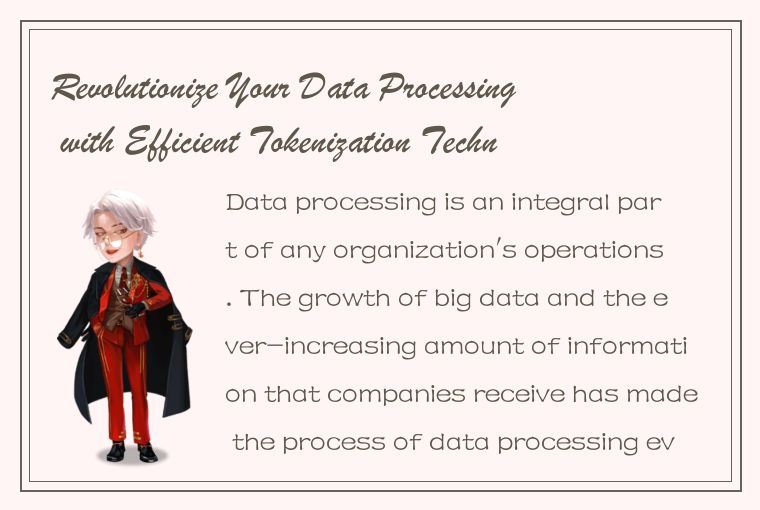Data processing is an integral part of any organization's operations. The growth of big data and the ever-increasing amount of information that companies receive has made the process of data processing even more critical. Tokenization techniques have revolutionized the way data is processed, and this article will explore what tokenization is, its benefits, and how it can improve data processing efficiency.

What is Tokenization?
Tokenization is a process that converts sensitive data into a token, a unique identifier that is meaningless to anyone who does not have the key to decrypt it. It is a security technique that is used to protect data, reduce the risk of fraud, and ensure the privacy of sensitive information.
Tokenization can be used to protect data such as credit card numbers, Social Security numbers, and other sensitive information used in financial and medical fields. It's a clever way to prevent sensitive data from being stolen or misused if an attacker gains access to the database.
Benefits of Tokenization
Tokenization has several benefits, including the following:
1) Enhanced Security
Tokenization enhances security by replacing sensitive data with an encryption token. Tokenization eliminates the need to store sensitive data, making it less vulnerable to theft or misuse by cybercriminals.
2) Increased Data Processing Efficiency
Tokenization can significantly improve data processing efficiency. Tokens are easier and faster to process than the original data. This process reduces the amount of time required to process large volumes of data, which can save time and ultimately reduce processing costs.
3) Improved Compliance
Tokenization is a technique that can help companies comply with data protection regulations. Data privacy legislation, including GDPR and CCPA, require companies to protect sensitive information. Tokenization can help organizations maintain compliance by ensuring that sensitive data is not stored in plain text format.
4) Reduced Cost
Investing in data security is costly, but tokenization can reduce the amount of money a company spends on data security. The cost of storing and protecting sensitive data is more expensive than tokenization, which can reduce the risk of a data breach.
How Tokenization can Revolutionize Data Processing
1) Faster Processing
Tokenization can lead to quicker data processing times. Tokens are short and concise, making them faster to process compared to sensitive data. Tokenization can save time and reduce the latency involved in processing data.
2) Improved Data Quality
Tokenization reduces the number of errors that occur during processing. Tokens are standardized and can be easily validated, promoting more accurate and reliable results.
3) Easier Data Sharing
Tokenization can simplify data sharing between different organizations. By tokenizing sensitive information, companies can share data without exposing the data in its original form. This procedure ensures that sensitive data remains confidential to the other party.
4) Robust Data Security
Data security is an essential part of data processing. Tokenization enhances data security by replacing sensitive data with a unique identifier. The tokenized data can be processed without risk of exposing sensitive data.
Conclusion
Tokenization techniques have revolutionized data processing by streamlining the process and enhancing data security. Tokenization offers several benefits, including improved data processing efficiency, decreased cost, easier data sharing, and robust data security. Tokenization can also help companies comply with data protection regulations while mitigating the risk of sensitive data loss. Investing in tokenization is worth the investment for any company that deals with sensitive data. Try tokenization today and start processing your data more efficiently than ever before.




 QQ客服专员
QQ客服专员 电话客服专员
电话客服专员